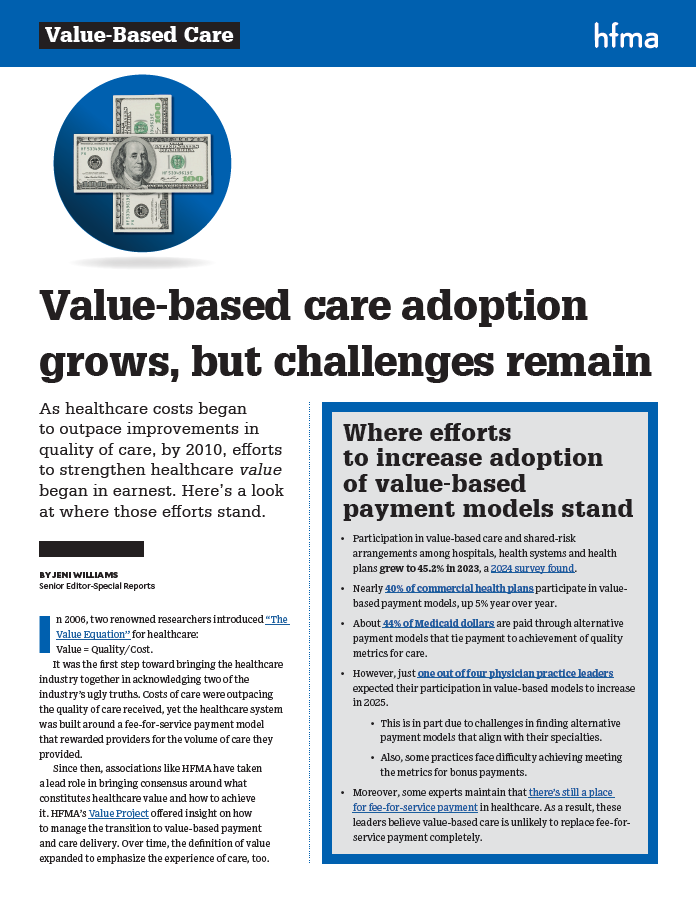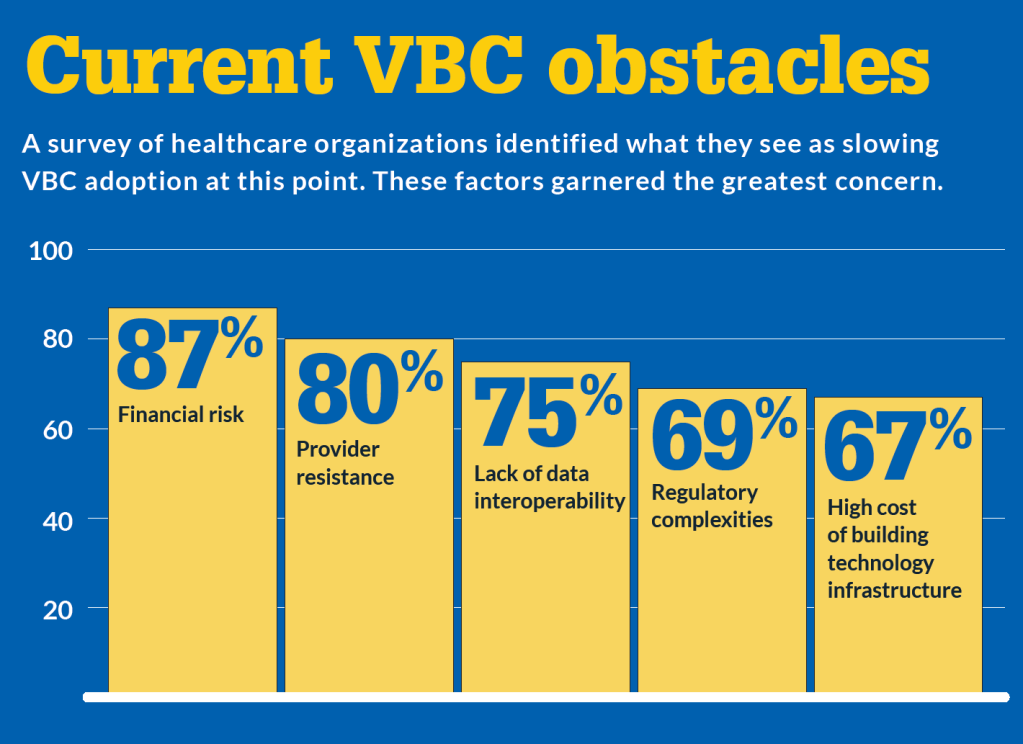Value-based care adoption grows, but challenges remain
As healthcare costs began to outpace improvements in quality of care, by 2010, efforts
to strengthen healthcare value began in earnest. Here’s a look at where those efforts
stand.
In 2006, two renowned researchers introduced “The Value Equation” for healthcare:
Value = Quality/Cost.
It was the first step toward bringing the healthcare industry together in acknowledging
two of the industry’s ugly truths. Costs of care were outpacing the quality of care
received, yet the healthcare system was built around a fee-for-service payment model
that rewarded providers for the volume of care they provided.
Since then, associations like HFMA have taken a lead role in bringing consensus around
what constitutes healthcare value and how to achieve it. HFMA’s Value Project offered
insight on how to manage the transition to value-based payment and care delivery. Over
time, the definition of value expanded to emphasize the experience of care, too.

Adoption of Value-Based Payment Models
Here’s where efforts to increase adoption of value-based payment models stand:
- Participation in value-based care and shared-risk arrangements among hospitals,
health systems and health plans grew to 45.2% in 2023, a 2024 survey found. - Nearly 40% of commercial health plans participate in value-based payment
models, up 5% year over year. - About 44% of Medicaid dollars are paid through alternative payment models that
tie payment to achievement of quality metrics for care. - However, just one out of four physician practice leaders expected their
participation in value-based models to increase in 2025.- This is in part due to challenges in finding alternative payment models that
align with their specialties. - Also, some practices face difficulty achieving meeting the metrics for
bonus payments.
- This is in part due to challenges in finding alternative payment models that
- Moreover, some experts maintain that there’s still a place for fee-for-service
payment in healthcare. As a result, these leaders believe value-based care is
unlikely to replace fee-for-service payment completely.
A Top Pressure Point for Healthcare Leaders
Value-based care, payment and contracting is an area where CFOs need to become
more up to speed if they are to assist in achieving the granular results expected, one
healthcare CFO told HFMA for its recent Healthcare CFO of the Future report.
“I don’t think, in a broad sense, that healthcare CFOs are really prepared for or attuned
for understanding what value-based care is, how it is going to get implemented in their
context and their type of organization, the principles of value-based care and how you
drive ROI around it,” said Stephen Forney, CFO of Covenant Health in Andover, Mass.,
a not-for-profit, regional health system.
Today, some organizations are exploring whether to create an executive role for value
because the journey toward value-based care and contracting is so complex. Some
others are seeking ways to partner more closely with health plans to ensure they are
paid fairly for participation in value-based contracts.

Four Recommendations to Continue Adopting Value-Based Care
Among the initial recommendations HFMA made to advance adoption of value-based
care, these four recommendations still ring true:
- Develop and educate physicians to lead the move toward value-based care
and payment. Physician buy-in and input remains critical to shaping participation
in value-based models and determining what works, what doesn’t and how to
evolve. - Experiment with payment models. The experience gained will inform where an
organization should invest, the types of results that are possible, and which
partners are best positioned to help guide the organization’s value-based
initiatives. - Make sure financial and clinical analytics are tightly integrated. This gives
an organization a basis for determining which populations to focus on — for
example, patients with uncontrolled diabetes — and the types of interventions
that work best. It also helps pinpoint areas for improvement. - Build scale over time. As experience with value-based payment models
increases, look for ways to expand existing efforts while testing new approaches.
Value-Based Care Resources
Check Out These Reports
Expand Your Knowledge with E-Learning
Stay ahead of industry trends with HFMA’s extensive e-learning courses and webinars.
Advance Your Healthcare Finance Career
Gain the skills you need to meet complex reporting demands with clarity and confidence. HFMA’s expert-designed certifications provide practical, up-to-date training—no matter where you are in your career.
Payment and Reimbursement Forum
Connect with other healthcare contracting professionals and share questions, answers, tools, and blog posts about payment and reimbursement issues.
Healthcare Finance Jobs
Find your next opportunity in revenue cycle or healthcare finance.
Discover Trusted Solutions
Elevate your results with products and services recognized by HFMA’s Peer Review program. Explore vetted solutions, each evaluated for quality, technical support, customer service, and value, across these key revenue cycle categories: Billing Compliance/Fraud & Abuse, Coding, Collection & A/R Debt Recovery, Denial Management/Third Party Recovery, Early Out/Self Pay, Patient Access/Eligibility, Patient Accounting/Revenue Cycle Systems, Patient Financial Experience, Patient Financing, and Revenue Cycle Outsourcing.





